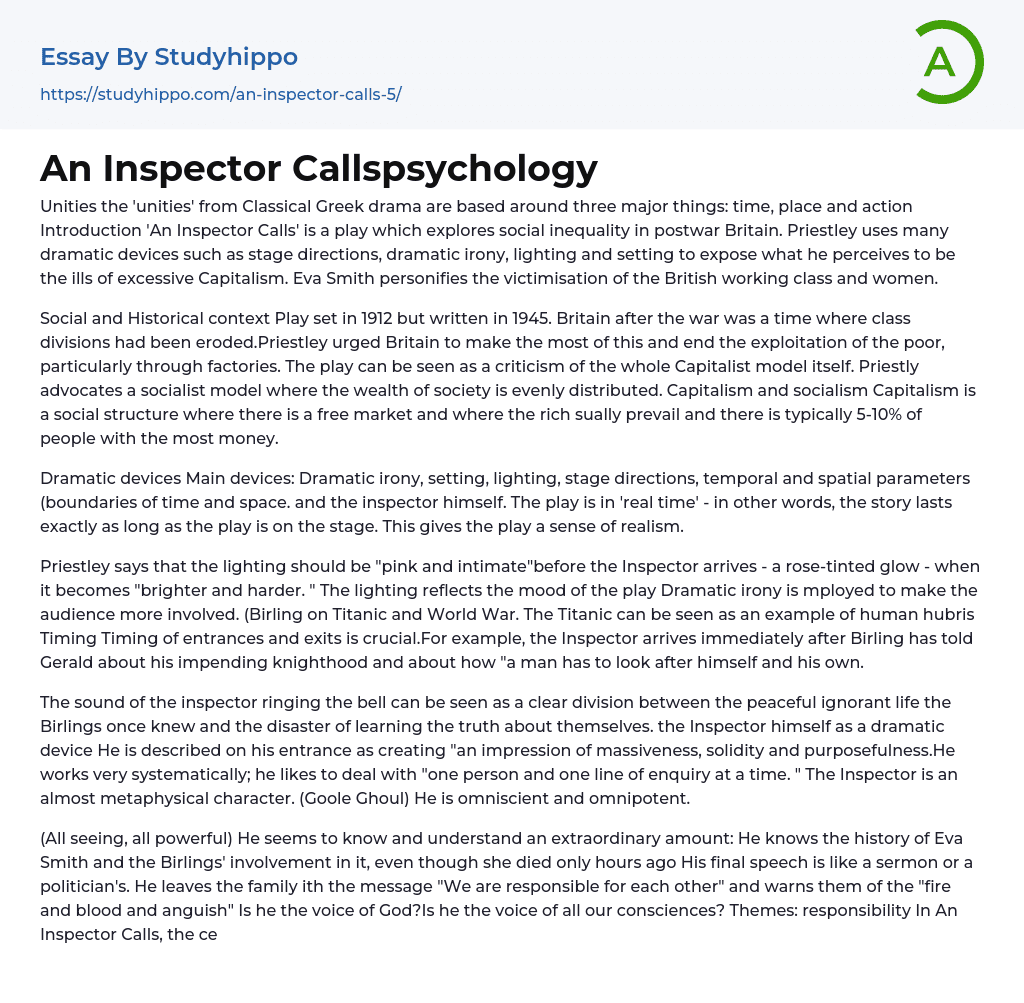In Classical Greek drama, the 'unities' revolve around three key elements - time, place and action. 'An Inspector Calls' is a play that delves into the issues of social inequality prevalent in Britain post World War II. To expose the negative impact of Capitalism, Priestley employs various dramatic techniques like stage directions, lighting, setting and dramatic irony. Eva Smith symbolizes the exploitation of the working class and women in British society.
The play is set in 1912 but was written in 1945, examining Britain's social and historical context after the war. During this time, class divisions had been eroded, and Priestley encouraged Britain to capitalize on this opportunity to end the exploitation of the poor through factories. The play can be interpreted as a critique of the entire Capitalist system, advocating for a socialist model whe
...re society's wealth is equally distributed. In contrast, Capitalism is a social structure characterized by a free market where the rich usually dominate, and typically only 5-10% of people hold the most wealth.
In order to create a sense of realism in the play, there are several primary dramatic devices utilized. These include dramatic irony, the use of setting to shape the story, lighting to create atmosphere, stage directions to guide performances, and the establishment of temporal and spatial parameters that define the boundaries of time and space. The character of the inspector himself also plays an important role. Notably, the play takes place in "real time," which means that the duration of the story is precisely as long as the play remains on stage.
Priestley suggests that the lighting should change from a "pink and intimate" rose-tinte
glow to a "brighter and harder" one after the Inspector arrives. This is because the lighting mirrors the mood of the play and is used to create dramatic irony that engages the audience. Additionally, Birling's discussion of the Titanic and World War illustrate human arrogance, while the timing of entrances and exits is crucial to the play. For example, the Inspector arrives just after Birling boasts about his upcoming knighthood and selfish beliefs of looking after oneself.
The ringing of the inspector's bell marks a distinct separation between the tranquil and uninformed existence that the Birlings had previously known and the revelation of their true nature. The inspector is employed as a dramatic tool, portrayed upon his arrival as conveying a sensation of grandeur, steadfastness, and resoluteness. He operates in a methodical manner, preferring to address "one person and one line of enquiry at a time." The inspector serves as an almost supernatural figure, referred to as "Goole Ghoul," possessing all-knowing and all-powerful qualities.
(All seeing, all powerful) The character in question displays an exceptional understanding of events, including the involvement of the Birlings in the history of Eva Smith, despite her recent death. His parting words to the family have a sermon-like quality, delivering the message of personal and collective responsibility and warning of potential consequences. Some may even consider him to be the voice of God or our own consciences. The play's central theme is responsibility, examining both individual and societal accountability for actions and how biases and prejudices can hinder responsible behavior based on factors such as class, age, and gender.
Priestley warns that if people do not learn the lesson of social responsibility,
they will be taught it through fire, blood, and anguish. The play 'An Inspector Calls' explores themes such as class, gender, and age. Priestley highlights how upper classes often fail to recognize that their comfortable lives depend on the hard work of the lower classes. Eva's situation, as a woman in a society where women were undervalued and lacked suffrage, emphasizes how gender compounds the struggles faced by low earners. The younger and older generations in the play interpret the Inspector's message differently. The danger of pride and arrogance among humans is underscored by Priestley's dramatic irony in the tragic events of the Titanic. Ultimately, 'An Inspector Calls' serves as a cautionary tale about social responsibility and the consequences of unchecked hubris.
The inspector's final speech resembles that of a religious sermon or political address. He embodies our collective societal conscience and emphasizes the potential within every individual to effect positive change in the world. He cautions the family of the consequences of neglecting their responsibility towards each other, warning of "fire and blood and anguish." This message remains pertinent today, even after sixty years.
- Abnormal Psychology essays
- Social Psychology essays
- Developmental Psychology essays
- Jean Piaget essays
- Positive Psychology essays
- Classical Conditioning essays
- Counseling essays
- Psychoanalysis essays
- Educational Psychology essays
- Behaviorism essays
- Authority essays
- Operant Conditioning essays
- Maslow's Hierarchy Of Needs essays
- Mental Health essays
- Personality Psychology essays
- Psychotherapy essays
- Family Therapy essays
- Stanford Prison Experiment essays
- Abraham Maslow essays
- Erik Erikson essays
- Cognitive Psychology essays
- Sigmund Freud essays
- Attachment Theory essays
- Supersize Me essays
- Individual essays
- Infant essays
- Childhood essays
- Adolescence essays
- Growth Mindset essays
- Is Google Making Us Stupid essays
- Childhood Memory essays
- Positive Attitude essays
- Reinforcement essays
- Archetype essays
- Maturity essays
- Deception essays
- Certainty essays
- Conformity essays
- Aggression essays
- Behavior essays
- Human Behavior essays
- Obedience essays
- Adult essays
- Procrastination essays
- Morality essays
- Altruism essays
- Human Sexuality essays
- Role Model essays
- Perseverance essays
- Expressive essays




